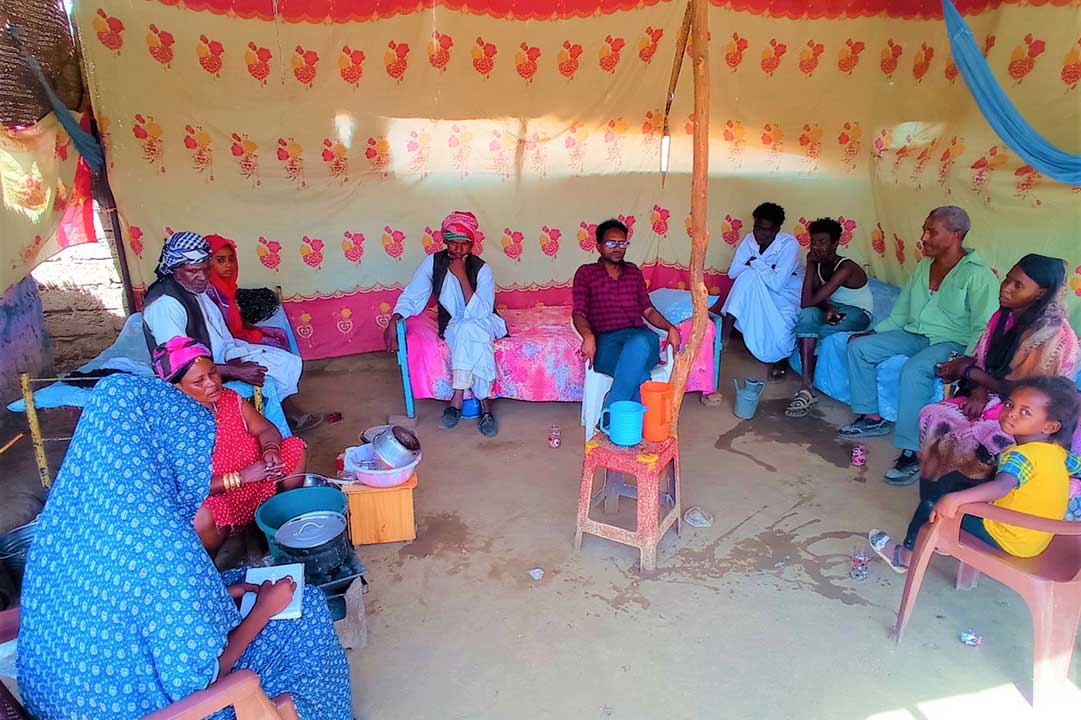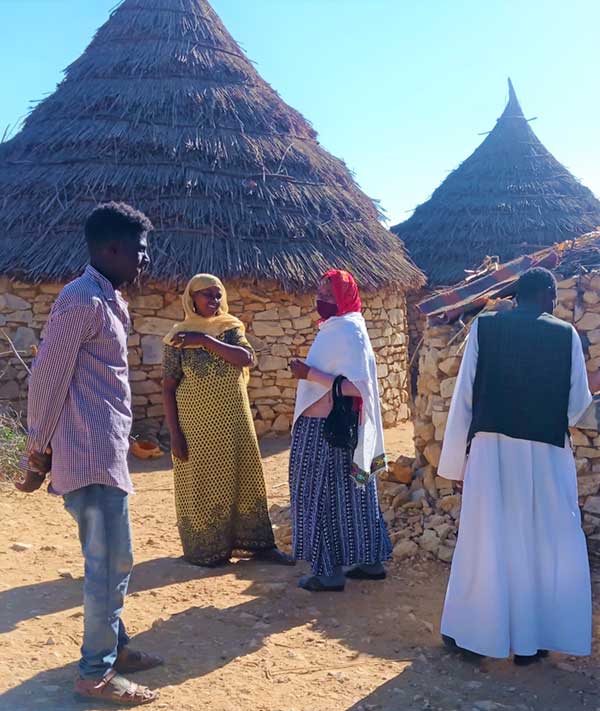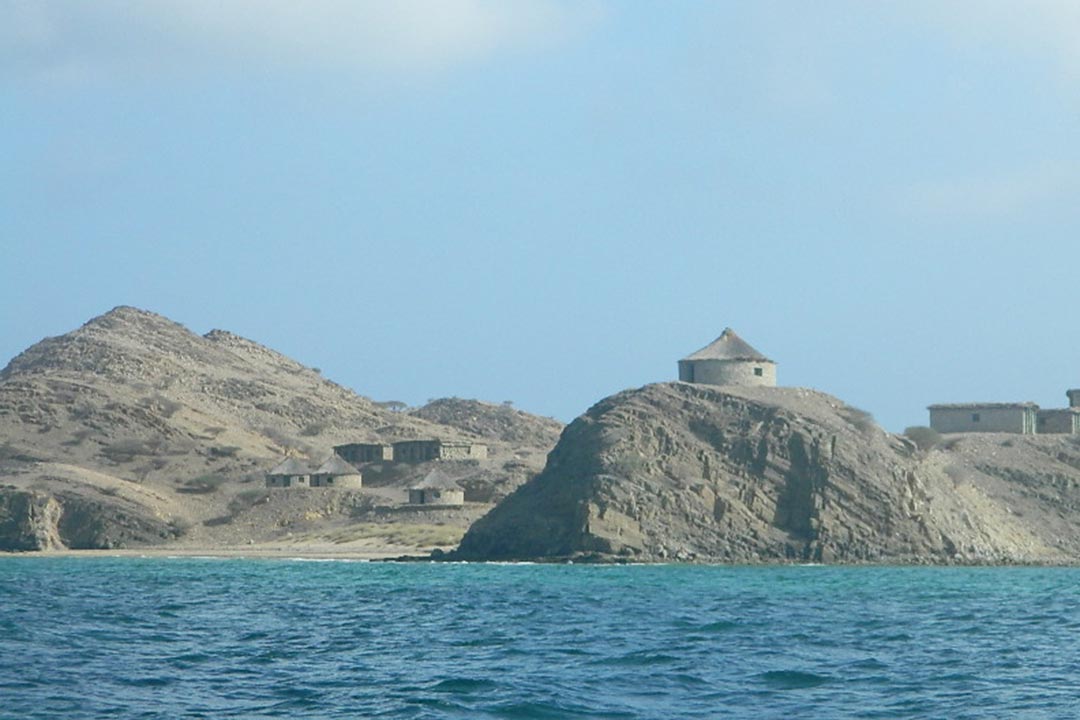Vaccinating Eritrea’s borderlands
Nura Hassen of Mekeserat, a village on Eritrea’s northern border, remembers the days of single-figure vaccination rates and “ordinary” childhood deaths. Things have changed.
- 22 February 2023
- 5 min read
- by Yosief Abraham Z.

It is morning in Mekeserat, a small village of traders on the porous northern border of Eritrea, and vaccinator Nura Hassen is sitting in the airy shade of a traditional porch, gazing back across the decades.
"Before 1991, it was ordinary news in this village, the death of children," she says. "For instance, I remember my neighbour, who had lost her beloved two children in July and November of 1990 to measles. There was nothing more painful than witnessing children die from the vaccine preventable diseases," says Hassen, a mother of three herself.
“They vaccinate our children without any fee. Even if we missed the day, they notify us – when possible – with a mobile call. If not, there are village representatives for the Health Ministry that take the responsibility,”
Located more than 370km from Asmara, the national capital, remote Mekeserat's immunisation rates lagged the low national average on the eve of independence. Countrywide, just 9.4% children counted as fully immunised in 1991, according to government data. In far-flung villages like Mekeserat, that figure stood closer to 4%.
"Before three decades, there were unscientific misconceptions regarding vaccinated children. Thus, we had to counteract them with intensified campaigns. Now, the rate of routinely immunised children is 91.2%*," Hassen says, looking over her lists of the families she means to visit in the area. Today, she is spreading the word about a vaccination outreach she will be conducting the following week.
There are fixed vaccination sites at Ali Ghider and Tesseney, some distance from Mekeserat. But in a village like this one, characterised by such high rates of intra-region migration, faced with transport shortages and a semi-nomadic population, scheduled mobile clinics and routine outreach services are indispensable.
Seniet Ali, a mother of three children, is one of the regular beneficiaries of childhood vaccination services for in Mekeserat. According to Hassen's records, she has never missed even a single vaccination appointment with any of her kids.
"They vaccinate our children without any fee. Even if we missed the day, they notify us – when possible – with a mobile call. If not, there are village representatives for the Health Ministry that take the responsibility," Ali explains. That's important, as Ali's family lives a highly mobile life. "Ramadan is the only time we reside here for several days. However, we are here in the appointed time for vaccinating our children."
Have you read?
As a village often visited by traders from neighbouring countries, Mekeserat is vulnerable to the cross-border spread of disease – a risk Hassen and her team are wary of. Lack of electricity, seasonal aridness and a hot climate are other challenges. Vehicles can be hard to come by, and especially in summer, camels are often the most reliable means of transportation.
"However, as every child has to be provided with the indispensable rights for proper vaccination within a ten kilometre span of area, we are extremely glued to tasks of outreach services," Hassen says. "To implement this on ground, therefore, not only in Mekeserat, even children from adjacent villages are also strictly followed up, for ensuring their vaccination in the scheduled time," she explains, pausing to greet Suleiman Haji Humed, a volunteer community mobiliser. Humed, proficient speaker of four of the languages spoken by the different ethnic communities of Mekeserat and its adjacent villages, first helps Hassen communicate her programmes to a group of seven family members and then sets off for another small hamlet. This spot, near Sebederat, is currently home to a few nomads, and lies a two-hour walk away.

Credit: Yosief Abraham Z.
The distances are made tougher by the heat. Six days a week, the vaccinating team gets to work early, before the sun gets scorching.
"Personally, we are adapted to the aridness and hot climate of this area," says Mohamed Barkay, an administrator of Alighider responsible for coordinating the volunteers who mobilise communities in this border region. "What we were challenged for before was the high rate of discarded vials and other expensive medicines due to the climate and lack of proper storages. Back then, administrating vaccines was insurmountably challenging."
That's changed. Today, the Ministry of Health provides the necessary vaccine storage equipment, with a fixed solar-powered cold-chain that reaches as far as Tesseney. For mobile clinics and outreach services, healthcare workers like Hassen extend the cold chain from Tesseney onward. "This in return enabled even children from far-flung villages to uptake their routine immunisation at the right time," explains Humed.
The effects are measurable. Government figures reveal that the nationwide mortality rate for children under five years of age stood at 153 in every 1,000 in 1991. In 2019, that figure had dropped to 40 in every 1.000. To keep this progress on track, vaccination remains an unflagging priority, even in far-flung communities like Mekeserat, and even during the strict COVID-19 lockdowns of 2020. That year, just shy of 1.5 million Eritrean children received routine vaccines – an increase of 14% against the previous year.
"Mekeserat's children are now in schools and playgrounds. Despite the challenges, [we are] witnessing how vaccines are saving lives of the children," Humed says, shuffling campaign brochures on diphtheria and measles in his hands.
* According to WHO, 95% of Eritrean children received the third dose of diphtheria, tetanus and pertussis-containing vaccine, the conventional indicator for full vaccination, in 2021.






